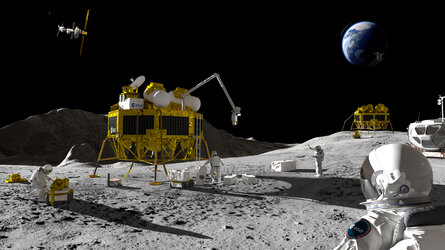Accept all cookies Accept only essential cookies See our Cookie Notice

About ESA
The European Space Agency (ESA) is Europe’s gateway to space. Its mission is to shape the development of Europe’s space capability and ensure that investment in space continues to deliver benefits to the citizens of Europe and the world.
Highlights
ESA - United space in Europe
This is ESA ESA facts Member States & Cooperating States Funding Director General Top management For Member State Delegations European vision European Space Policy ESA & EU Space Councils Responsibility & Sustainability Annual Report Calendar of meetings Corporate newsEstablishments & sites
ESA Headquarters ESA ESTEC ESA ESOC ESA ESRIN ESA EAC ESA ESAC Europe's Spaceport ESA ESEC ESA ECSAT Brussels Office Washington OfficeWorking with ESA
Business with ESA ESA Commercialisation Gateway Law at ESA Careers Cyber resilience at ESA IT at ESA Newsroom Partnerships Merchandising Licence Education Open Space Innovation Platform Integrity and Reporting Administrative Tribunal Health and SafetyMore about ESA
History ESA Historical Archives Exhibitions Publications Art & Culture ESA Merchandise Kids Diversity ESA Brand CentreLatest
Space in Member States
Find out more about space activities in our 23 Member States, and understand how ESA works together with their national agencies, institutions and organisations.
Science & Exploration
Exploring our Solar System and unlocking the secrets of the Universe
Go to topicAstronauts
Missions
Juice Euclid Webb Solar Orbiter BepiColombo Gaia ExoMars Cheops Exoplanet missions More missionsActivities
International Space Station Orion service module Gateway Concordia Caves & Pangaea BenefitsLatest
Space Safety
Protecting life and infrastructure on Earth and in orbit
Go to topicAsteroids
Asteroids and Planetary Defence Asteroid danger explained Flyeye telescope: asteroid detection Hera mission: asteroid deflection Near-Earth Object Coordination CentreSpace junk
About space debris Space debris by the numbers Space Environment Report In space refuelling, refurbishing and removingSafety from space
Clean Space ecodesign Zero Debris Technologies Space for Earth Supporting Sustainable DevelopmentLatest
Applications
Using space to benefit citizens and meet future challenges on Earth
Go to topicObserving the Earth
Observing the Earth Future EO Copernicus Meteorology Space for our climate Satellite missionsCommercialisation
ESA Commercialisation Gateway Open Space Innovation Platform Business Incubation ESA Space SolutionsLatest
Enabling & Support
Making space accessible and developing the technologies for the future
Go to topicBuilding missions
Space Engineering and Technology Test centre Laboratories Concurrent Design Facility Preparing for the future Shaping the Future Discovery and Preparation Advanced Concepts TeamSpace transportation
Space Transportation Ariane Vega Space Rider Future space transportation Boost! Europe's Spaceport Launches from Europe's Spaceport from 2012Latest

Maser 12 launch
Thank you for liking
You have already liked this page, you can only like it once!
Launch of Maser 12 sounding rocket in 2013.
Five experiments on a Maser rocket were launched from northern Sweden today. Faster than most people take a coffee break, Maser-12 travelled 250 km upwards, provided six precious minutes of microgravity, and landed safely back on Earth.
Launched at 09:30 GMT on 13 February, it took only 45 seconds for the ‘sounding rocket’ to leave the atmosphere. Once it ran out of propellant, the mission had only just begun for the scientists watching on the ground.
They had around six minutes to run their experiments and collect data during the weightlessness.
On this mission, Maser felt the heat: one experiment used a small furnace to cook a metal sample to 700°C.
At this temperature, the mixture of aluminium and copper turned liquid before it was frozen inside a cooling chamber to solidify into crystal clusters. An X-ray camera captured this dramatic experiment for analysis.
Maser-12 also featured experiments in molecular biology. The weightless behaviour of human immune-cells was compared with that of their counterparts on the ground. Another experiment looked at how blood transports cells.
By observing how cells behave in microgravity, scientists gain a better understanding of how they work on Earth.
Lastly, a liquid was observed to help understand boiling and heat transfer.
Parachutes released automatically on Maser’s trip down, guaranteeing a soft landing for the payload module.
But there is only so much you can research from a distance, so the search and rescue service at Sweden’s Esrange returned the experiments to the scientists for more detailed analysis.
In the vast wilderness of northern Sweden, it helps that a satnav device comes as standard on a Maser. The retrieval team pinpointed the landing site and the experiments were returned by helicopter within an hour of touchdown.
-
CREDIT
SSC -
LICENCE
ESA Standard Licence

Maser 13 recovery

MASER 11 sounding rocket launches from Esrange

Maser 14 infographic

Esrange launch tower














 Germany
Germany
 Austria
Austria
 Belgium
Belgium
 Denmark
Denmark
 Spain
Spain
 Estonia
Estonia
 Finland
Finland
 France
France
 Greece
Greece
 Hungary
Hungary
 Ireland
Ireland
 Italy
Italy
 Luxembourg
Luxembourg
 Norway
Norway
 The Netherlands
The Netherlands
 Poland
Poland
 Portugal
Portugal
 Czechia
Czechia
 Romania
Romania
 United Kingdom
United Kingdom
 Slovenia
Slovenia
 Sweden
Sweden
 Switzerland
Switzerland

























